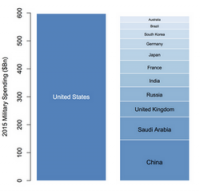-
Cyber attacks ten years on: from disruption to disinformation
Today – 27 April — marks the tenth anniversary of the world’s first major coordinated “cyberattack” on a nation’s internet infrastructure: Russian government hackers attacked the computer systems of the government of Estonia in retaliation for what Russia considered to be an insult to the sacrifices of the Red Army during the Second World War. This little-known event set the scene for the onrush of cyber espionage, fake news, and information wars we know today. A cybersecurity expert recently told the Senate Select Committee on Intelligence that to understand current Russian active measures and influence campaigns — that is, to understand cyber operations in the twenty-first century – we must first understand intelligence operations in the twentieth century. Understanding the history of cyber operations will be critical for developing strategies to combat them. Narrowly applying models from military history and tactics will offer only specific gains in an emerging ecosystem of “information age strategies.” If nations wish to defend themselves, they will need to understand culture as much as coding.
-
-
Empowering ISIS opponents on Twitter
A new RAND report draws on earlier RAND research on how to leverage social-media influencers and tailor messages to design a data-driven, actionable strategy to counter ISIS on Twitter. While social media is still relatively new, many of the best practices for using it are based on well-understood marketing approaches – and countering ISIS on social media should be informed by these best practices.
-
-
Local, federal focus on deadly gang violence on Long Island
There has been a surge since 2014 in the number of unaccompanied minors coming to the United States, mostly from El Salvador, Guatemala, and Honduras. Most of the minors are entitled to federal anti-trafficking protections, and subsequent resettlement. Suffolk Country is ranked fourth in the U.S. in the number of unaccompanied minors resettled in the county, and neighboring Nassau County ranks tenth. Violent gangs such as MS-13 actively recruit these unaccompanied minors. Local and federal leaders say there is a need to do more – from better vetting to gang prevention programs to better law enforcement – to address the growing gang violence.
-
-
World military spending: Increases in the U.S., Europe, decreases in oil-exporting countries

Total world military expenditure rose to $1686 billion in 2016, an increase of 0.4 percent in real terms from 2015, according to new figures from the Stockholm International Peace Research Institute (SIPRI). Military spending in North America saw its first annual increase since 2010, while spending in Western Europe grew for the second consecutive year.
-
-
Populism, terrorism converge to compound global risks
Aon publishes 2017 Risk Maps for Political Risk, Terrorism and Political Violence shows there has been a 14 percent increase in the number of terrorist attacks worldwide in 2016, up to 4,151 from 3,633 in 2015. Western countries saw a 174 percent increase in terrorist attacks in 2016, up from 35 attacks in 2015 to 96 attacks in 2016. Oil and gas companies were the target of 41 percent of terrorist attacks on commercial interests in 2016 and the trend has continued in 2017. But 2017 marks the first year in the last four where as many countries experienced a decline in political risk for investors as those experiencing an increase. This suggests a modest improvement in economic resilience after many years of deterioration. The potential for divergence between the United States and Europe around sanctions regimes could create uncertainty for investors in Iran, Russia, and even Cuba.
-
-
ISIS control of people down 83% in Iraq, 56% in Syria from peak levels
The Islamic State has lost substantial control of territory and people since 2014 in Iraq, Syria, Afghanistan, Libya, and Nigeria — and is on a path to collapse as a self-proclaimed state, according to data compiled in a new report. Still, the Islamic State continues to conduct and inspire attacks around the world in an effort to exact revenge on its enemies, coerce the withdrawal of foreign forces, and bait foreign governments into overreacting. These attacks may even increase once the group loses its core caliphate.
-
-
The worry over North Korea

The risk of war on the Korean peninsula is low, says a nuclear arms expert. “Both sides are rattling sabers, but neither side is going to start a war,” says Belfer Center’s Gary Samore. “We recognize that a military attack on North Korea would probably not be effective in terms of destroying North Korea’s nuclear weapons and missile program and would run the risk of a North Korean retaliation against South Korea and Japan, which could cost hundreds of thousands of lives. And the North Koreans know that any attack on U.S. allies in the region would provoke an American response that would destroy them.”
-
-
Bioterrorists, using genetic editing, could kill more than 30 million people: Bill Gates
A bioterrorist attack could kill thirty million people — and such an attack is becoming more likely because it has become much easier to create – or “design” — deadly pathogens and spread them. Bill Gates, Microsoft founder, speaking in London, said that an outbreak of a lethal respiratory virus like smallpox would be more dangerous than even a nuclear attack. Anyone can now purchase chemistry kits which allow genetic editing, and do so online for under $150.
-
-
Syrian defector: Assad still has hundreds of tons of chemical weapons stockpiled
Syrian President Bashar al-Assad circumvented a 2013 deal to dismantle his chemical weapons stockpile by failing to declare the full extent of his arsenal, Syria’s former chemical weapons research chief. Brigadier-General Zaher al-Sakat, who served as the head of chemical warfare in a top Syrian military unit before defecting in 2013, said that Assad had not declared large amounts of sarin and its precursor chemicals.
-
-
Bee colonies-inspired tool to help dismantle terrorist cells, criminal social networks
Researchers have designed an algorithm, inspired by the intelligent and social behavior of bee colonies, which allows law enforcement to attack and dismantle any type of social network that poses a threat, whether physical or virtual, such as social networks linked to organized crime and jihadist terrorism. The possible applications of this new bio-inspired algorithm, which helps to make optimal decisions in order to dismantle any type of social network, are many and varied: from dismantling a criminal network to facilitating the design of vaccination strategies capable of containing the spread of a pandemic.
-
-
Insufficient evaluation efforts by feds of counter- extremism strategy: GAO
Violent extremism — generally defined as ideologically, religious, or politically motivated acts of violence — has been perpetrated in the United States by white supremacists, anti-government groups, and radical Islamist entities, among others. In 2011, the U.S. government developed a national strategy and Strategic Implementation Plan (SIP) for countering violent extremism (CVE) aimed at providing information and resources to communities. “The federal government does not have a cohesive strategy or process for assessing the overall CVE effort,” GAO says.
-
-
Morocco’s counterterrorism initiatives are effective: Study
The number of terrorist incidents in the Maghreb and Sahel regions of Africa rose 14 percent in 2016, reaching the second highest level since 9/11. A new study says that despite this alarming trend, Morocco and Mauritania registered zero terrorist incidents in 2016, and that Morocco has been the country least-affected by terrorism in the region over the past fifteen years.
-
-
Rise of terrorism in Africa
The recent terror attack by al Shabaab in the port city of Barawe in southern Somalia, a suicide bomb attack by Boko Haram in Maiduguri in Nigeria, and an attack on a military post in Mali by an al Qaeda-linked terror group have brought the focus back on terrorism in the African continent. Over the years, terrorism has become the most important challenge to peace, security and development in Africa. The terror activities have grown exponentially in the continent, not only in terms of the number of attacks but also the number of countries affected due to increased proliferation of terrorist groups.
-
-
Examining counter-extremism policy in the Sahel
To find out what young people involved in jihadist groups in Mali are thinking, you need to speak to them. It sounds logical, and yet a new study by the Institute for Security Studies (ISS) is one of the first to do this in the Malian context. The research helps change the discourse about violent extremism in West Africa and how to respond to it.
-
-
Illegal armed groups pose “persistent threat” to Africa's Great Lakes region: UN
The United Nations envoy for Africa’s Great Lakes region encouraged the countries of the region, and the UN Security Council, to help strengthen the fight against illegal armed groups in the Democratic Republic of the Congo (DRC) and its neighbors, particularly as elements of the former M23 rebel group have resurfaced.
-
More headlines
The long view
Factories First: Winning the Drone War Before It Starts
Wars are won by factories before they are won on the battlefield,Martin C. Feldmann writes, noting that the United States lacks the manufacturing depth for the coming drone age. Rectifying this situation “will take far more than procurement tweaks,” Feldmann writes. “It demands a national-level, wartime-scale industrial mobilization.”
No Nation Is an Island: The Dangers of Modern U.S. Isolationism
The resurgence of isolationist sentiment in American politics is understandable but misguided. While the desire to refocus on domestic renewal is justified, retreating from the world will not bring the security, prosperity, or sovereignty that its proponents promise. On the contrary, it invites instability, diminishes U.S. influence, and erodes the democratic order the U.S. helped forge.
Fragmented by Design: USAID’s Dismantling and the Future of American Foreign Aid
The Trump administration launched an aggressive restructuring of U.S. foreign aid, effectively dismantling the United States Agency for International Development (USAID). The humanitarian and geopolitical fallout of the demise of USAID includes shuttered clinics, destroyed food aid, and China’s growing influence in the global south. This new era of American soft power will determine how, and whether, the U.S. continues to lead in global development.
Water Wars: A Historic Agreement Between Mexico and US Is Ramping Up Border Tension
As climate change drives rising temperatures and changes in rainfall, Mexico and the US are in the middle of a conflict over water, putting an additional strain on their relationship. Partly due to constant droughts, Mexico has struggled to maintain its water deliveries for much of the last 25 years, deliveries to which it is obligated by a 1944 water-sharing agreement between the two countries.
How Disastrous Was the Trump-Putin Meeting?
In Alaska, Trump got played by Putin. Therefore, Steven Pifer writes, the European leaders and Zelensky have to “diplomatically offer suggestions to walk Trump back from a position that he does not appear to understand would be bad for Ukraine, bad for Europe, and bad for American interests. And they have to do so without setting off an explosion that could disrupt U.S.-Ukrainian and U.S.-European relations—all to the delight of Putin and the Kremlin.”
How Male Grievance Fuels Radicalization and Extremist Violence
Social extremism is evolving in reach and form. While traditional racial supremacy ideologies remain, contemporary movements are now often fueled by something more personal and emotionally resonant: male grievance.
